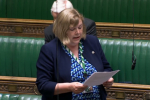Transcript:
I would first like to express my support for this Bill as a whole. We absolutely must do everything we can to return the bodies of victims to their loved ones to ensure that they are afforded a proper burial and an opportunity to say goodbye. The death of any loved one can have a profound impact on family members and friends. From the testimony of the McCourt family, who have been the driving force behind this Bill, and that of many others, it is clear that that is magnified in cases of murder, and further still when an offender refuses to disclose where they have left the body of their victim. It is also right that the measures in this Bill extend to those who have been convicted of abusing children and making indecent images of their victims. That is a heinous crime, and families of potential victims deserve answers.
Turning to the amendment, I doubt that anyone would dispute the need to ensure that victims and their families are kept apprised of any parole applications and, indeed, of every stage of the parole process thereafter. Over the past few years as a caseworker for my predecessor and now as the Member of Parliament, I have supported constituents of mine such as the Weedon family, whose daughter Amanda was subjected to a frenzied attack by a complete stranger when walking home from her job as a nurse at a local hospital. She sustained 37 knife wounds. Even more shockingly, it was reported that the attack happened while the perpetrator was visiting the grave of his first victim. The perpetrator of these horrific crimes was sentenced to life imprisonment in the 1980s but made a parole application earlier this year. The family were subsequently informed of this and were able to make a victim personal statement and challenge the Parole Board’s decision in the necessary timeframe. Unfortunately, in this case, the prisoner was released, but the families were at least given the opportunity to make their views known.
It is crucial that victims and their families are given a voice and treated on a level playing field with the offender. Indeed, Amanda’s father, Horace Weedon, who sadly passed away earlier this year, played an active role in the years following Amanda’s murder in improving the support afforded to victims’ families, even delivering a talk at HMP Gartree to prisoners serving life sentences. I would like to take this opportunity to pay tribute to his work.
I welcome the fact that, as the Minister highlighted, there is already a well-established process in place, delivered through the victim contact scheme, which keeps victims and their families up to date with parole applications. Sadly, however, there are still too many cases in which victims and their families are not provided with that information and find out that an offender has been released only when it is reported in the media. That is wrong. Even if the Government consider that creating a database is not the right solution, we need to look again at the process and how it can be improved, not just in the specific instances covered by the Bill but more widely.

